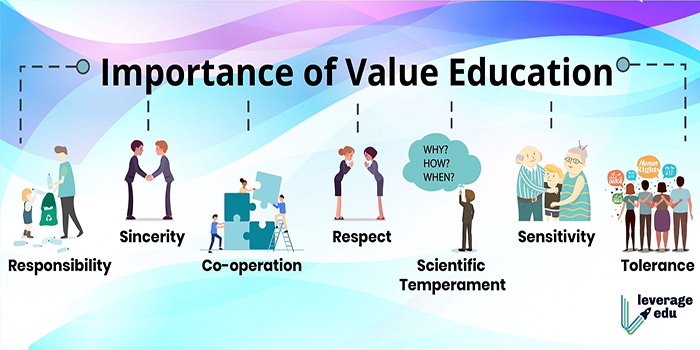
Values education is a focus on teaching children and adolescents the values that are important in their daily lives. This includes teaching them about moral, ethical, spiritual, and social values, as well as developing the skills needed to make decisions and take action in the face of difficult situations. It involves helping young people develop the skills and knowledge to make responsible decisions and take appropriate action in their lives. Values education also includes teaching children and adolescents about the importance of respecting diversity, developing a sense of community, and developing a commitment to social justice.
Importance of Values Education
Values education is important because it helps to shape a person‘s character and determines how they act and make decisions. It helps people to develop their moral, ethical and spiritual values, which can guide them throughout their lives. Values education also helps people to become more aware of the consequences of their decisions and how they impact the world around them. By understanding values, people are better able to make informed decisions and become more responsible citizens. Values education also teaches people to be tolerant of different beliefs and cultures, which can lead to a more harmonious society. Finally, values education helps to foster positive attitudes and behaviours, and encourages people to be contributing members of society.
Purpose of Values Education
Values education is a process of teaching and learning about the ideals and core beliefs that a society believes to be important. It is an important part of any educational curriculum and is intended to help students cultivate moral and ethical standards that they can use in their daily lives. Values education can help students develop a sense of purpose and responsibility, an understanding of justice, and respect for diversity. It can also help students recognize the importance of making positive contributions to the world around them.
How To Find Tution and Teacher For Values Education
1. Ask your friends and family: Ask around in your network of family and friends if they have any recommendations for tutors or teachers who specialize in values education.
2. Contact your local school board: Reach out to your local school board and ask for any information they may have on tutors or teachers who specialize in values education.
3. Search online: You can use search engines like Google to look for tutors or teachers who specialize in values education. Be sure to read reviews carefully to make sure you select a reputable tutor or teacher.
4. Look for local classes: You can also search for classes in your local area that focus on values education. You can often find classes at community centers, churches, and other places.
5. Contact organizations: Contact organizations that focus on values education, such as the Values Education Council, to ask for referrals or resources.
6. Hire a private tutor: You can also hire a private tutor to help you learn more about values education. Make sure to research the tutor‘s qualifications and experience before hiring them.
Point That Cover in Values Education
• Respect for Human Life and Dignity: Respect for human life and dignity is an essential part of values education. This includes respect for oneself, for others, and for the environment.
• Justice and Equality: Values education should promote justice and equality, respecting the rights of all people regardless of gender, race, age, or social status.
• Responsibility: Values education should emphasize the importance of taking responsibility for one’s own actions, decisions, and choices.
• Honesty and Integrity: Values education should encourage honesty and integrity, teaching students the importance of being truthful and trustworthy.
• Compassion and Empathy: Compassion and empathy are important values that should be taught in values education. This includes understanding the feelings of others and being kind and considerate towards them.
• Self-Discipline: Self–discipline is an important value that should be taught in values education. This includes developing the ability to control one’s emotions and behaviors.
• Cooperation and Collaboration: Cooperation and collaboration are important values that should be taught in values education. This includes working together and finding ways to solve problems.






